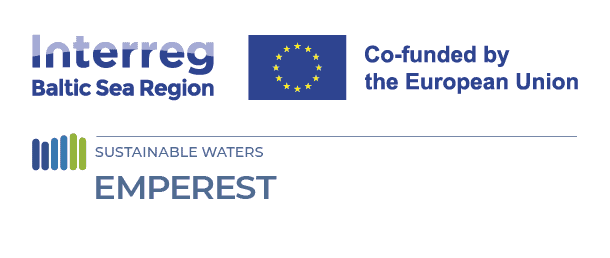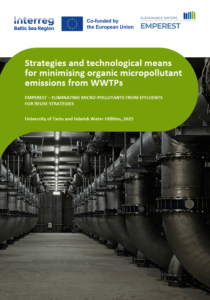
OUTPUT: Strategies and technological means for minimising organic micropollutant emissions from WWTPs
12 November 2025
The revised Urban Wastewater Treatment Directive (rUWWTD) sets new and more stringent measures to safeguard the environment and public health, including the implementation of the quaternary treatment. By 2045, all wastewater treatment plants over 150 000 PE must adopt quaternary treatment to remove a broad spectrum of micropollutants.
The implementation of this ambitious goal is where EMPEREST comes in: this project piloted advanced, or quaternary, wastewater treatment technologies across seven cities in the Baltic Sea region to test the removal efficiency of organic micropollutants and PFAS. For that, the project deployed two sets of mobile pilot containers.
Pilot testing is essential due to the complexity and cost of advanced treatment technologies, playing a critical role in verifying their effectiveness, feasibility, and sustainability before full-scale implementation. By enabling flexible, real-world testing and comparative performance analysis, it supports wastewater operators in selecting scalable, cost-effective solutions tailored to local conditions and regulatory requirements, while informing evidence-based planning for future infrastructure investments.
Two sets of pilot plants in container housing were constructed locally, respectively, by the Gdansk Water Utilities Ltd. and Tartu Waterworks Ltd., to test the selected proven technologies at the wastewater treatment plants in different combinations with varying process parameters. After the first round of testing, the mobile containers continued their journeys to five more cities. During the testing periods in each site, regular analysis of water samples allowed to assess the effectiveness of the technologies in the removal of micropollutants and thus support the piloting WWTPs in making informed decisions regarding most suitable trains of technologies for their conditions.
The EMPEREST project successfully demonstrated the effectiveness of advanced treatment technologies such as ozonation, granular activated carbon, ion exchange, and nanofiltration for removing organic micropollutants listed in the revised UWWTD, reaching the removal efficiency between 89-100% on the pilot scale.
In addition to the micropollutants, special attention was given to PFAS compounds, which are notoriously resistant to degradation and conventional treatment processes. Granular activated carbon (GAC) filtration used alone or in combination with ozonation and/or sand filtration proved highly effective in removing micropollutants listed in the rUWWTD, but its efficiency in eliminating PFAS compounds was limited and varied depending on compound type and operational conditions. Advanced oxidation processes, such as ozonation, can degrade certain pollutants but may unintentionally transform long-chain PFAS into more mobile and persistent short-chain variants, potentially increasing their concentrations in treated effluent. Among the tested technologies, ion-exchange resins showed the highest removal efficiency for long-chain PFAS, although short-chain compounds remain difficult to eliminate. These findings underscore the importance of combining treatment methods and implementing comprehensive analytical screening to accurately assess PFAS removal performance.
In connection with the testing and upcoming deployment of advanced treatment technologies, EMPEREST also fostered regional collaboration and capacity building, enhancing the professional readiness for implementing next-generation wastewater treatment strategies.
The mobile piloting activities attracted significant media attention and were discussed on many prominent fora in the Baltic Sea region and beyond.
The activities carried out in the EMPEREST project demonstrated that mobile pilot plants are highly cost-effective tools for supporting the upgrade and development of numerous wastewater treatment plants, without the need to incur the high costs of constructing individual pilot installations.

Read the Strategies and technological means for minimising organic micropollutant emissions from WWTPs (PDF), developed in the EMPEREST project by the University of Tartu in collaboration with Gdansk Water Utilities Ltd and all other testing WWTPs.
Annex 1: Pilot-scale removal of micropollutants at the Wschód WWTP in Gdańsk
Annex 2: Pilot-scale removal of micropollutants at the WWTP Pomorzany in Szczecin
Annex 3: Pilot-scale removal of micropollutants at the Kaunas WWTP
Annex 4: Pilot-scale removal of micropollutants at the Tartu WWTP
Annex 5: Pilot-scale removal of micropollutants at the Tallinn WWTP
Annex 6: Pilot-scale removal of micropollutants at the Turku WWTP





